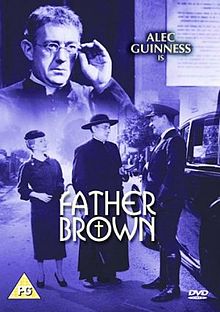
FATHER BROWN - DETECTIVE
UK, 1954, 93 minutes, Black and white.
Alec Guinness, Peter Finch, Joan Greenwood, Cecil Parker, Bernard Lee, Ernest Thesiger, Sid James.
Directed by Robert Hamer,
Father Brown is based on the famous detective created by G.K. Chesterton. In a series of short stories, Chesterton's Father Brown confronts all kinds of criminals, solves cases and brings many of the criminals to understand the wickedness of their ways and even moves to some kind of conversion.
This is the case in this film, a robbery story. Father Brown is played by Alec Guinness in a rather absent-minded short-sighted dithering way - with the touch of shrewdness and wisdom. At this time Guinness had appeared in many of the Ealing Studios comedies and was about to make The Cardinal, based on the story of Cardinal Mindzenty, and The Swan with Grace Kelly. Peter Finch is the suave French thief. Bernard Lee appears as a police inspector, Cecil Parker as the bishop, Sid James as the criminal who has to reform at Father Brown's insistence and become the chauffeur for Joan Greenwood.
The film is set in a London parish. However, it moves across the channel (with a number of priests going on pilgrimage seasick) and moves to Paris. When Father Brown is robbed of his parish's precious cross, he has to go back to France to track down the gentleman thief, confront him in his castle, persuade him to give up all his stolen goods to an exhibition, so that they are works of art not just for himself but for the public. The film ends optimistically with Father Brown preaching in the church and the thief entering the church and sitting, listening to Father Brown.
1. A 50s entertainment, an Alec Guinness vehicle, a British company?
2. The work of G.K. Chesterton as a British author, his literature, his love of paradoxes and insights, his creation of Father Brown? Updated to the 1950s?
3. The black and white photography, the British and French settings, Paris, the countryside, the chateau? The musical score?
4. The Catholic church in the 1950s before the changes of the 60s? The role of priests, their garb, way of life, work in the parish, liturgy? The confrontations with bishops? The mixing with the people, serving the parishioners? The work of art in the church?
5. The structure of the film: Father Brown versus Flambeau, the theft of the cross, eluding the police, confronting the criminal, demanding honesty, some kind of conversion?
6. The opening with Father Brown, his arrest, letting the criminal go free, in jail, unknown, his glasses and being unable to see, the contents of his pockets? His being released by the bishop's secretary? Having to go to see the bishop, the discussions, his always getting into trouble? The issue of the cross, the preservation of the cross?
7. Father Brown as a character created by Alec Guinness, his appearance, dithering manner, innate shrewdness, the issue of the cross, his plan to stop Flambeau stealing it, going with the cross in the paper parcel, with all the priests, on the ferry, being seasick? Sitting with Flambeau, the discussions, the friendliness? In Paris, Flambeau eating a meat sandwich on Friday, Father Brown exchanging the parcels, Flambeau changing them back? In the catacombs, the confrontation between the two, Flambeau overcoming Father Brown, tying him up? His escape? His telling the police that Father Brown was in the catacombs?
8. The police, the officer pretending to be a salesman, Father Brown seeing through him? Their following Father Brown, the pursuit, losing them in the catacombs? The reappearance in France, at the chateau?
9. Father Brown and Lady Warren, friendship, parishioner? His persuading her to put the chess set up to auction? The range of clients and their approaching, the different nationalities and idiosyncrasies, from Americans to Indians? Flambeau and his disguise, carrying the set around for people to view? The melodrama of the auction, Father Brown suspecting the clients? The Indian and his gift of the chess set back to Lady Warren? Flambeau robbing the set, Father Brown pursuing him but evading the police?
10. Flambeau and his coming to the house, his returning the chess set? The discussions with Father Brown?
11. The emblem, Father Brown collecting the information, going to the library, the comic interchange with the ancient librarian and his breaking his glasses? Getting a new set? Going by train to the village, eluding the police? Riding on the hayrack, sleeping in the haystack, going to the chateau, searching for the hidden door, confronting Flambeau, their discussions about morality, about theft, about keeping works of art for themselves? Flambeau and his explanation of his background, character, wanting the treasures, the ability to steal? Keeping them at home? His escape from the police?
12. The exhibition, his restoring the works of art to the public, his looking at the exhibition? His return to England, coming into the church at Mass, sitting next to Lady Warren? His listening to the sermon, the sermon and the good shepherd and the message of the film?